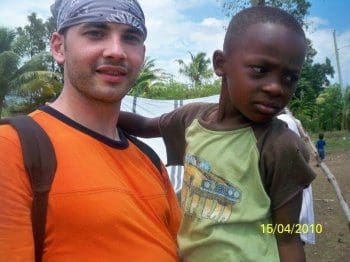Beyond Your Years with Luis Martinez
The Blessings of Generosity
“America has been named as the world’s most generous nation, where its citizens give the most to charity, according to a new report.” Sounds great! But how do we keep our nation on the top of the list? I’ve always loved this French expression: Noblesse oblige. Loosely translated it means ‘nobility has obligations’. While we wouldn’t refer to ourselves as nobility, we have a lot to be thankful in this exceptional nation. We have, in the aggregate, unprecedented wealth compared to every other nation. If we internalize the concept of noblesse oblige, it suggests that we act with kindliness, honor, openhandedness, and generosity to those less fortunate both here in our nation and abroad.
One of the most interesting things about philanthropy and charity is that they are ancient concepts. Philanthropy and charity are not unique to our western world, nor are they an invention of our modern times. In our western culture we can find the word philanthropy as far back as 500 years BC. Philanthropy means ‘the love of humanity’ and is generally believed to have been coined 2500 years ago by the Greeks in the mythological tale Prometheus Bound. But philanthropy as an active duty is even older than that. Its roots extend as far back as Babylonian times, 2,000 years BC. A very interesting article by the SOFII informs: “It was written that Egyptian deities expected any person seeking immortality to swear that they had never denied food to the starving, drink to the thirsty or clothing to the ragged. Many religious tenets would later be written decreeing that the faithful must also be charitable, which stemmed from philanthropy’s roots in antiquity.”
Another useful concept is that philanthropy and charity describe different aspects of the same coin. We all participate in charitable giving: donating our used clothing or articles, writing a check to our house of worship, buying a meal for homeless men living under a bridge. Charitable giving is necessary and essential and fairly easy to accomplish via our time, talent and treasure. Philanthropy is more strategic, more future focused. It attempts to identify the root cause of homelessness, domestic abuse, alcoholism, human trafficking and other ills of society. Here’s how an iconic philanthropist, John Rockefeller defined it: “The best philanthropy is constantly in search of the finalities—a search for a cause, an attempt to cure evils at their source.”
The earliest example that I can remember of my parents being charitable was when I was a little boy in Cuba. A man passing by our house in Havana suddenly dropped to the sidewalk, convulsing and hitting his head on the ground. I called my mother who came running outside. She brought a towel and used it to wrap the man’s bleeding head. She then hailed a passing taxi and we put the epileptic man in the back seat of the taxi who roared off to the nearest clinic. A few days later, I watched that injured man come back to our house bringing back the towel, nicely washed and pressed.

Missionary work is another form of philanthropy. Our daughter Alison has been a missionary in Malawi, Haiti, Ecuador, and Galapagos Islands. Our son Alex has been on two missions to Haiti teaching the locals how to create sustainable methods for potable water. Another example is when Alison lived in Denver and she used to bring food and clothing to two alcoholic men who lived under a bridge. Alison packed the food inside large tin cans so the rats wouldn’t eat it. The younger man, Karl, a Veteran estranged from his wife and daughter, eventually left the bridge and joined AA. John, the older one remains under that bridge in Denver.
What can we do as individuals to help? There are many small ways that add up. For example, put all your pocket change in a jar and when it’s full take it to the charity of your choice. Find out if your employer will match some portion of your donation to a designated charity. Volunteer your talent as a Board member of a house of worship or community not-for-profit. Explore the many ways to give to charity via the internet, including via your smart phone. And keep track of all your tax deductible contributions.
Think small! In your giving, be cognizant that the national trend is for wealthy donors to give to well established, high profile charities. But small charities helping the poor in your neighborhood need your support as well. Speaking of our community, in Rochester, ROC the Day is coming up on November 30th. Take time to think of a cause you can support, make your contribution and together with all your friends and neighbors we can keep Rochester on the short list of America’s most generous cities.
“He who is generous will be blessed.” Proverbs 22:9
Luis Martinez is a guest blogger for St. John’s. He is an active senior that likes to observe and write about how people work at their careers, guide their businesses, strengthen their families, stay physically fit and mentally sharp, and race their sports cars. Luis habla español. Follow Luis on Twitter @BeyondYourYears, or email Luis@HumanCapitalSP.com
